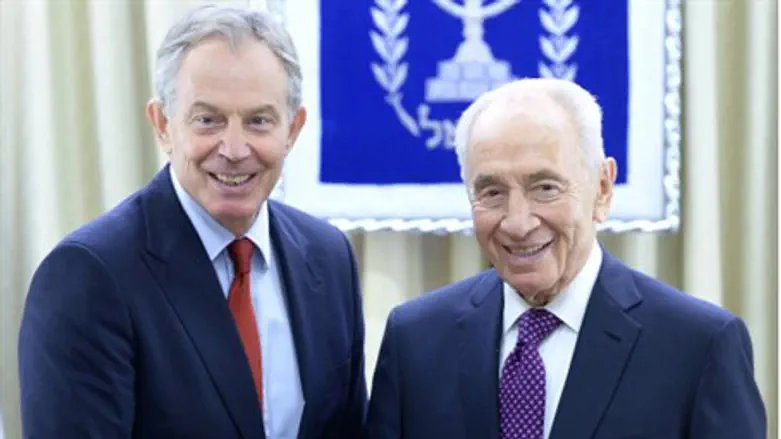
President Shimon Peres said Thursday that the present time period is “the most crucial time since the establishment of the new Middle East in 1948.”
Peres’s comments were made during a meeting with the Quartet Representative to the Middle East, former British Prime Minister Tony Blair, which focused on the peace talks between Israel and the Palestinian Authority (PA).
During the meeting Peres called for “historic decisions” when it comes to the peace process.
"We are now facing the most crucial time since the establishment of the new Middle East in 1948,” he said. “Since then the world has changed considerably but one thing reminds me of the beginning and that is the importance of the decisions. This is a time for historic decisions, not political ones.”
Peres continued, “Whatever decisions will be taken will have an historic effect with consequences that will be hard to change afterwards. All of us must come together and understand the depth and the seriousness of the choice before us. There is a window of opportunity, we can make peace with the Palestinians, and I believe that Abu Mazen is serious in his will to do so. The fact that there are differences is normal. We all have to understand that we don't have unlimited time and to understand that the wrong decision is irreversible.”
“We have opportunity to make the right decision which is two states solution, a Jewish state called Israel and an Arab state called Palestine. I know you share the feeling of the weight of the decision," he told Blair.
Blair expressed his support for President Peres's statement and added, "I believe this is a profound moment for the opportunity to make peace, I hope on all sides there is the courage, vision and determination to move forward.”
“We will continue to work very hard to put alongside the political process the economic initiative to improve the lives of people on the ground to give them hope and a stake in the future,” he added. “It can be done and it should be done but it needs a political wind behind it. We're all striving very hard and particularly with all the turmoil this is the right moment to create out of this part of the Middle East some sense of hope based on the principles of societies that are open-minded and tolerant and economies that are modern and offer opportunity for our young people."
The comments come a day after U.S. Secretary of State John Kerry’s plan for peace was outlined by Thomas Friedman in the New York Times.
According to Friedman, Kerry’s plan will call for a phased Israeli withdrawal from Judea and Samaria based on the 1949 lines, with "unprecedented" security arrangements in the strategic Jordan Valley.
The Israeli withdrawal will not include certain settlement blocs, but Israel will compensate the Arab side for this with Israeli territory. The deal will call for “Palestine” to have a capital in Arab eastern Jerusalem and to recognize Israel as the nation state of the Jewish people.
The plan was blasted by Deputy Defense Minister Danny Danon, who made clear that “it is not going to happen.”
“Israel will not split Jerusalem nor will it withdraw to the pre-1967 lines,” Danon said, adding, “The only thing good about this plan is that the Palestinians will recognize Israel as a Jewish state. It’s about time.”
On Wednesday, Peres opined at the Institute for National Security Studies (INSS) that Jews would be "safe" living under PA rule. He was responding to Economy Minister Naftali Bennett, who rejected such a proposal by Prime Minister Binyamin Netanyahu.
"What's this fear that's struck us suddenly? They'll kill Jews? Today?" he said. "The fear should have been in 1948 when we didn't have a cannon, tank or plane against seven armies."


